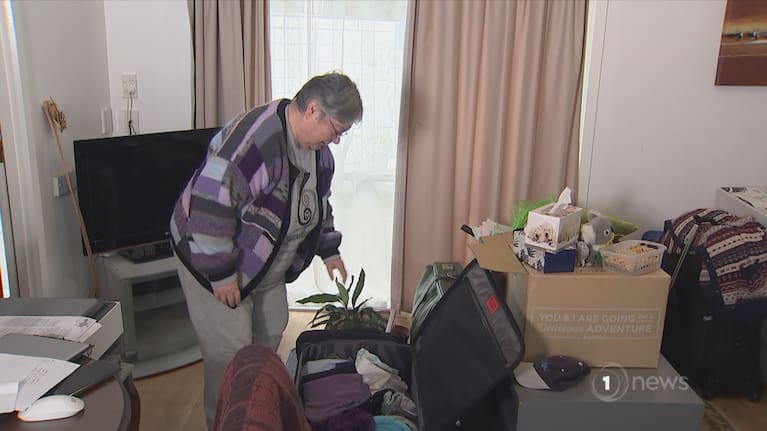Sixty-six-year-old Donna Bridgeman has gotten used to living out of a suitcase.
Since losing her long-term rental, the Kāpiti Coast resident has moved five times in three years. It became so hard for her to find a property that she’s now in an emergency accommodation motel, surrounded by boxes of her things.
“I feel despondent, angry, down in the dumps … it has affected my mental health” she said.
Bridgeman used to be a homeowner but lost the house when her marriage broke up.
It particularly affects women and there's an urgent need to address the problem.
She’s been moved on from multiple rentals as owners have sold up. She says she either can’t afford or won’t be considered for most properties in the region.
Many ads for one or two-bedroom houses specify that they want young professionals as tenants. Bridgeman says she knows a number of women her age in the same situation.
“We can't afford to go into a retirement village, where do we go? It's just private rentals and they're getting less and less and less.”
Bridgeman is one of what researchers and social services say is a growing number of older Kiwi women finding themselves homeless.
There's little data on homelessness among seniors as they are generally affected less than younger people.
But, figures from the last Census show severe housing deprivation among Kiwis aged 65+ rose more than in any other age group - a 24 per cent increase between 2013 and 2018.
The Government’s Homelessness Action Plan 2020-2023 says older people are “increasingly vulnerable to homelessness”, with single older women renting in the private market identified as a particularly at-risk group.
The issue is partly due to income - the Ministry for Women estimates New Zealand women earn nearly $900,000 less over a lifetime than men.
Covid-19 has also had an effect - women held 10,000 of the 11,000 jobs that were lost during last year's Covid-19 lockdown according to Statistics New Zealand.
Retirement Commissioner Jane Wrightson says the trends we’re seeing now are “the tip of the iceberg”.
“The impact of Covid was worse for women than men … most of life shocks are, and so what that tells us is that for the next ten or twenty years women will be playing catch-up.”
Kahungunu Whānau Services chief executive Ali Hamlin-Paenga says there’s been a noticeable rise in homelessness among older women in the past two years.
“Many of them have become homeless for the first time … the loss of a partner or dear one, generally that partner has been the breadwinner.”
Another driver is domestic violence, which she says some Māori women face even in their 60s, 70s and older.
“It is very hard to even reach out to your family because there's a sense of whakamā, shame that sits alongside this. [They are] just disappearing and not having any contact with people so as not to burden them as well.”
Housing researcher Bev James says homelessness among older Kiwis can often be “hidden”.
“We're not talking about these people necessarily being visible like rough sleeping or on the streets. They're more likely to be in situations where they're sharing with others in difficult circumstances.
"They're under sufferance there or they're in sleepouts, garages, sheds, non-residential dwellings like farm buildings or commercial buildings.”
Hamlin-Paenga says many short-term accommodation options aren’t suitable for older women and more permanent, Māori-led solutions need to be found.
“Boarding house style accommodations aren't always good for them, a lot of emergency housing environments are very unsafe … they're at risk of sexual abuse, they're at risk of any type of abuse really because they are vulnerable.”
“You're going to get a better solution when Māori providers are at the front and leading in the area of homelessness. These people are never going to own their own home again and many of them don't want to, all they're asking for is some sort of permanency.”
As for Bridgeman, she’s not sure where she’ll be moving to next, or when.
“Am I going to stay homeless? Am I going to stay in a motel? How's the Government going to be able to afford it, and then what happens?" she asks.
"I just want a place where I can be until I'm carried out in a box.”



















SHARE ME